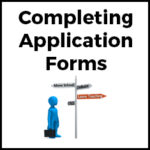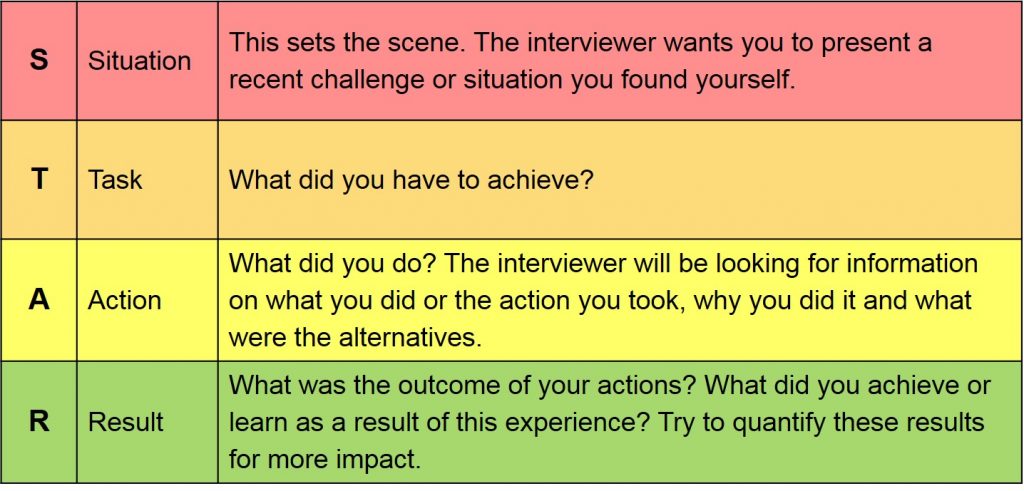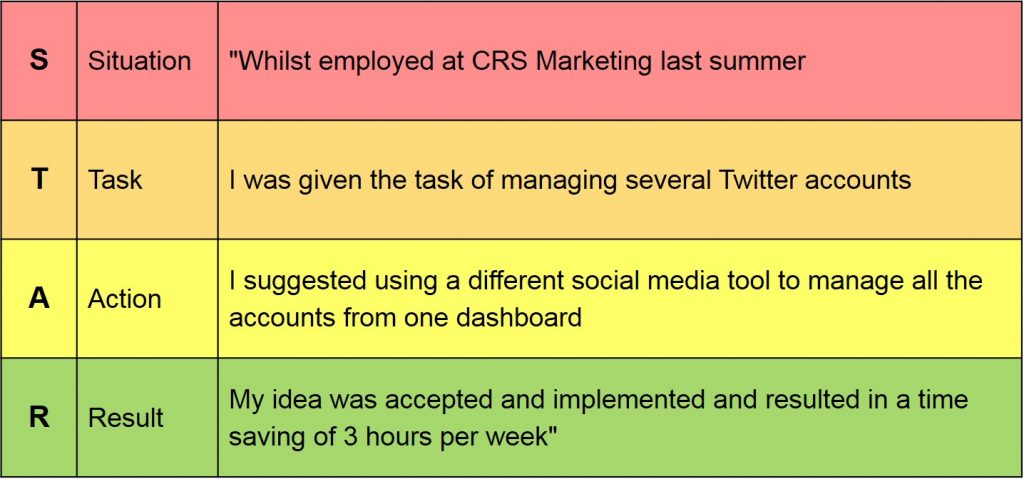Competency-based questions
After leaving teaching, the first thing I noticed was how long some of the job application forms were! They involved a lot more than I was used to as a teacher. It wastes a great deal of time filling in application forms and even then you can’t guarantee you’ll be shortlisted for interview. It is therefore very important to make sure that you complete the application forms properly.
The first applications forms I completed asked questions that I wasn’t used to in my career as a teacher, and those were competency-based questions. Competency-based questions are asking about skills, talents and abilities to perform the job. They are based on the idea that if you’ve used the skills before, you will be able to perform them to the necessary standard again.
They normally begin with “Describe a situation where you had to…” or “Give an example of when you…” and are looking for examples of specific skills such as teamwork, leadership, persuasiveness, project management and how you react when things don’t go to plan. The questions, either on a job application form or in interview, require you to give specific real-life examples of when you demonstrated the particular skills or attitudes. Usually you are asked to describe a specific problem or situation, what actions you took to solve the problem, and what the result was.
“Describe a time when you were responsible for coordinating a small project from initiation to completion, how did you plan, execute and evaluate the project?“
“Please explain by using an example of a time when you unexpectedly had to change your approach or schedule when something didn’t go according to plan. Describe the situation, what you did and the outcome.”
Two examples of competency-based questions
The STAR Technique
One way of answering these questions is by using the STAR technique – Situation, Task, Action and Result.
Situation
This sets the scene. Describe the situation you were involved in from a personal experience, education, your current or previous job, or any other relevant example. This needs to be no more than one or two sentences.
Task
What did you have to achieve? Briefly describe in no more than a sentence or two what you were tasked with and/or what your responsibilities were. The Situation and Task are sometimes combined and form the introduction.
Action
The Action you took should form the main body of your answer, and you should describe all the actions you took to resolve the problem, situation or task. You should detail each stage to show your thought processes, showing the steps you completed to reach the conclusion. This is the area that often lacks sufficient detail.
Result
The Result should be your conclusion. This should be a successful outcome to show how effective your actions were. What did you achieve or learn as a result of this experience. If appropriate, what would you do differently next time? (That may be asked as an interview question).
Ideally, you aim to quantify the results as evidence to show your success. “We won the cup”; “Membership of the society increased by 20%”; “We raised £400 for charity”. Positive feedback from others is also good evidence. You could also talk about what you learned from the experience and what you would do differently next time.
Here is an example of how the STAR technique can be used:
Key Competencies
Here are some key competencies that you may be asked questions about in application forms or in interview:
Communication
It is important to build good relationships with clients and colleagues. There are several communication skills that you can demonstrate, including Emotional Intelligence, Clarity, Friendliness, Confidence, Empathy, Respect, Listening, Open Mindedness and Tone of Voice. Person specifications often refer to “adapting communication to different audiences”. Example question: Describe a situation where you had to explain something complex to a colleague or a client. Which problems did you encounter and how did you deal with them?
Decision Making
Problems can be solved by good decision making. Your answer to this type of question should include the stages of 1) Identifying the problem, 2) Developing solutions, 3) Evaluating benefits and disadvantages of each solution, 4) Selecting the most suitable solution, 5) Implementing the solution, 6) Reviewing the impact of the decision. It’s also important to describe your reflective and evaluative approach to making improvements. Example question: Describe a time when you had to make a difficult decision and why was it so difficult?
Leadership
Employers are looking for evidence that you can focus on the task, delegate where you can, bring people together, motivate people to get the job done and lead a successful team. Example question: Describe a situation where you needed to inspire a team. What challenges did you meet and how did you achieve your objectives?
Results Orientation
As a teacher, you will know the importance of results! Here, you could talk about anything from improving a system/process through to hitting targets. Example question: Give me an example of a time when you believe you were successful.
Teamwork
Employers want team players and will always ask questions about collaborative working. They will want to know why you’re good at it and so you should talk about how you listen and respond constructively to others, that you’re open with other team members about their concerns, that you express disagreement constructively (e.g. by suggesting alternatives), that you express support for other people’s great ideas, and that you give honest and constructive feedback. Example question: Describe a situation in which you were working as part of a team. How did you make a contribution?
Influence and Persuasion
As teachers, we have succeeded in getting the most reluctant of students (and sometimes parents) to do things our way, for example turning up to after-school revision sessions. Some people have even gone as far as saying that teachers “sell education to reluctant customers”. Example question: Tell us about a time when you persuaded others to accept an idea of yours.
Motivation
As a teacher, we need to keep students motivated so they can achieve their goals. Example question: Give me an example of when you have motivated others.
Responsibility
People who have been in positions of responsibility are highly valued by employers. If you are a teacher who has been in positions of responsibility then you will have many examples to talk about. Example question: Describe a situation when you held responsibility for completion of a task.
Professional Development
Employers want to see that you’re open to enhancing your skills. Example question: When was the last Continuing Professional Development that you completed, and how did this help your role?
Technical Skills
Example question: Please give examples of when you have used the Microsoft office packages Word, Excel and PowerPoint with speed, accuracy and creativity.
Managing a Quality Service
I had to complete a section on this topic in an application form for a Civil Service job. The section began, “Effectiveness in this area is about valuing and modelling professional excellence and expertise to deliver service objectives, taking account of diverse customer needs and requirements. People who are effective plan, organise and manage their time and activities to deliver a high quality, secure, reliable and efficient service, applying programme, project and risk management approaches to support service delivery.” My response scored highly in “Sift Feedback” feedback and overall my application was successful in getting me shortlisted for interview. Example question: How do you and your team identify and deliver the standards required by your customers?
Delivering at pace
This was another section in an application form for a Civil Service job. It began, “Effectiveness in this area means focusing on delivering timely performance with energy and taking responsibility and accountability for quality outcomes. For all staff, it’s about working to agreed goals and activities and dealing with challenges in a responsive and constructive way.” Example question: Tell us about a time when you had to sacrifice quality in order to speed up a project.
Competency-based Questions I have been asked
Here are some competency-based questions that I had to answer in one of my application forms for a university job which involved coaching, mentoring and supporting students and recent graduates to develop and launch their businesses. I answered these questions using the STAR technique and was successful in being shortlisted for interview:
- Please outline your experience of supporting business start-ups. (Essential to the job)
- Please give an example of a recent event that you organised from start to finish. (Essential to the job)
- Please give an example of when you have built and sustained a working relationship with a senior person from the business community. (Essential to the job)
- Please give an example of a time when you had competing deadlines to achieve in a work role and how you managed your time accordingly. (Essential to the job)
- Please give an example of how you solved a work-related problem, demonstrating your customer-focussed outlook. (Essential to the job)
- Please give an example of a successful team-based project that you were instrumental in delivering. (Essential to the job)
- Please give examples of when you have used the Microsoft office packages Word, Excel and PowerPoint with speed, accuracy and creativity. (Essential to the job)
- Please give an example of a successful advertising or marketing campaign that you have run. (Desirable for the job)
- Please outline your knowledge or experience of regional entrepreneurial networks. (Desirable for the job)
- Please give an example of your involvement in project management preferably of a student/graduate employability project. (Desirable for the job)
Competency-based questions will most probably also be asked in the interview, and more on this and other questions can be found in Interview Questions.
Further information:
The most common competency-based interview questions (and how to answer them) – Total Jobs
If you’re thinking of leaving teaching then the Thinking of Leaving Teaching Group might be a good place to get some ideas. It is a safe place for people to ask for help and advice, discuss topics and share opinions about jobs you can do if you leave teaching.



